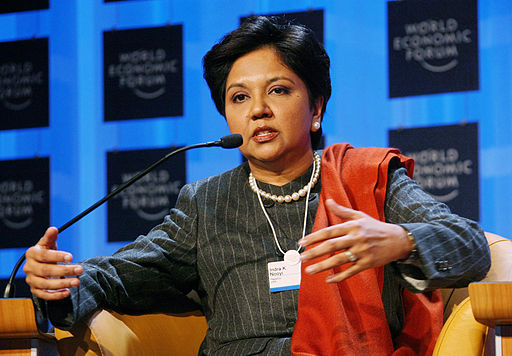Chapter 1 Learning about Organizational Behavior
LEARNING FROM EXPERIENCE: Indra Nooyi, Chairman and CEO, PepsiCo
Indra Nooyi became the CEO of PepsiCo in 2006 and was elected to the additional role of chairman of the board in 2007. PepsiCo has approximately 263,000 employees. It manufactures, markets, and sells 22 different brands of snacks and beverages worldwide. This opening feature provides a few insights about Indra Nooyi in her own words.
My father was an absolutely wonderful human being. From him I learned to always assume positive intent. Whatever anybody says or does, assume positive intent. You will be amazed at how your whole approach to a person or problem becomes very different. When you assume negative intent, you’re angry. If you take away that anger and assume positive intent, you will be amazed. Your emotional quotient goes up because you are no longer almost random in your response. You don’t get defensive. You don’t scream. You are trying to understand and listen because at your basic core you are saying, “Maybe they are saying something to me that I’m not hearing.” So “assume positive intent” has been a huge piece of advice for me.
In business, sometimes in the heat of the moment, people say things. You can either misconstrue what they’re saying and assume they are trying to put you down, or you can say, “Wait a minute. Let me really get behind what they are saying to understand whether they’re reacting because they’re hurt, upset, confused, or they don’t understand what it is I’ve asked them to do.” If you react from a negative perspective—because you didn’t like the way they reacted—then it just becomes two negatives fighting each other. But when you assume positive intent, I think often what happens is the other person says, “Hey, wait a minute, maybe I’m wrong in reacting the way I do because this person is really making an effort.”
Since becoming chairman and CEO, I’ve seen that one of the ways to inspire people is by having a vision that everyone can get behind. At PepsiCo, that vision is “Performance with Purpose.” It’s our company’s long-term strategy for delivering strong financial results while responding to the changing demands of our consumers and the marketplace.
Performance with Purpose rests on three pillars: human sustainability, environmental sustainability, and talent sustainability. For example, we’re transforming our product portfolio in order to offer consumers healthier choices—everything from nourishing beverages and snacks that are good for you, to healthier, fun-for-you treats. This is human sustainability. We’re also driving initiatives to sustain the environment where we and our consumers live and work. And we’re committed to attracting, training, and retaining the best talent because the ability of PepsiCo to meet our performance goals and deliver our purpose agenda rests in the hands of our 263,000 associates around the globe.
To learn more about PepsiCo, go to www.pepsico.com.
Indra Nooyi is a highly competent person and leader, as suggested in her remarks and confirmed through many forms of recognition by others. This opening feature suggests just a few of the elements in her rich portfolio of personal competencies. We will have more to say about these and the other competencies demonstrated by Nooyi as the chapter unfolds.
The Organizational Behavior Division of the Academy of Management, the leading professional association dedicated to creating and disseminating knowledge about management and organizations, identifies the major topics of organizational behavior as follows:
individual characteristics such as beliefs, values, personality, and demographic attributes, and individual processes such as learning, perception, motivation, emotions, and decision making; interpersonal processes such as trust, justice, power/politics, social exchange, and networks; group/team characteristics such as size, diversity, and cohesion, and group/team processes such as development, leadership, decision making and cooperation and conflict; organizational processes and practices such as leadership, goal setting, work design, feedback, rewards, communication, and socialization; contextual influences on individuals and groups such as organizational and national culture, and organizational identity and climate; and the influence of all of the above on individual, interpersonal, group, and organizational outcomes such as performance, creativity, attachment, citizenship behaviors, stress, absenteeism, turnover, deviance, and ethical behavior.
We address all of these topics and more in this book.
One theme of this book is to demonstrate the importance of organizational behavior to your own performance. You are or probably will be an employee of an organization—and in all likelihood of several organizations—during your career. You may eventually become a team leader, a manager, or an executive. Studying organizational behavior will help you attain the knowledge and competencies needed to perform effectively in all of these roles. The knowledge and competencies that you acquire will help you diagnose, understand, explain, and act on what is happening around you in your job.
In the first section of this chapter, we introduce the elements of leadership versus management. Our general learning framework for achieving effective performance by individuals, teams, and organizations is presented next. In the remaining sections of this chapter, we explain each of the seven key competencies that are woven into the chapters throughout the book.
Organizational behaviorThe study of individuals and groups within an organizational context, and the study of internal processes and practices as they influence the effectiveness of individuals, teams, and organizations. is the study of individuals and groups within an organizational context, and the study of internal processes and practices as they influence the effectiveness of individuals, teams, and organizations. The field is characterized by a systems approach. That is, organizational behavior strives to understand and improve people–organization relationships in terms of the individual, team, organization, and broader social system.

